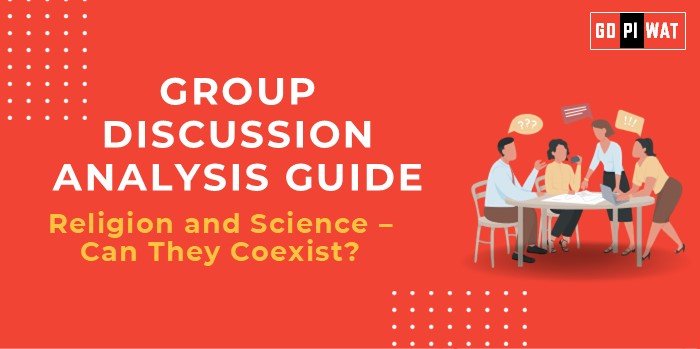📋 Group Discussion (GD) Analysis Guide: Religion and Science – Can They Coexist?
🌟 Introduction to the Topic
Opening Context:
The relationship between religion and science has been a subject of intellectual debate for centuries. While religion offers moral frameworks and existential meaning, science seeks empirical explanations of the natural world. Their perceived conflict often revolves around divergent worldviews and methodologies, yet both continue to influence modern society profoundly.
Topic Background:
Historical clashes, such as the Galileo affair, often symbolize the tension between religion and science. However, modern discourse increasingly explores their compatibility, with growing calls for integrating ethical considerations into scientific progress and scientific understanding into religious practices.
📊 Quick Facts and Key Statistics
- 🌍 Religious Adherence: 85% of the world population identifies with a religious group (Pew Research Center, 2023).
*Significance*: Demonstrates religion’s pervasive influence globally. - 🔬 Scientific Growth: Global R&D spending reached $2.5 trillion in 2022 (UNESCO).
*Significance*: Indicates science’s expanding role in technological and societal advancements. - 🤝 Religion-Science Collaboration: 60% of scientists in a global survey agree religion and science can coexist (AAAS, 2022).
*Significance*: Suggests a growing perception of compatibility. - ⚖️ Moral-Scientific Dilemmas: 78% of surveyed individuals believe ethical guidelines should frame scientific endeavors (World Values Survey, 2023).
*Significance*: Highlights shared concerns over unchecked scientific progress.
🤝 Stakeholders and Their Roles
- 📖 Religious Institutions: Advocate moral considerations in scientific research.
- 🔬 Scientific Community: Pursues knowledge advancement while addressing ethical implications.
- ⚖️ Policymakers: Balance religious freedoms with promoting evidence-based decision-making.
- 🌍 Global Organizations: Facilitate dialogues, e.g., UNESCO’s science-ethics initiatives.
- 👥 Citizens: Navigate personal beliefs while engaging with scientific advancements.
🎯 Achievements and Challenges
Achievements:
- 🤝 Collaborative Efforts: Initiatives like Templeton Foundation promote dialogue between faith and science.
- ⚖️ Ethical Advancements: Application of bioethics in genetic research balances scientific potential with moral concerns.
- 🌍 Cultural Integration: Countries like India embrace both religious diversity and scientific progress.
Challenges:
- ⚠️ Conflicts Over Beliefs: Evolution and climate change remain contentious in certain religious communities.
- ⚠️ Ethical Dilemmas: Technologies like AI and genetic engineering spark debates over moral boundaries.
- ⚠️ Misinformation: Pseudoscientific claims often blend with religious ideologies, complicating public discourse.
🌍 Global Comparisons
- 🇺🇸 USA: High tensions in public debates, e.g., creationism vs. evolution in schools.
- 🇸🇪 Scandinavian Countries: Model for coexistence through secular scientific policies.
Case Study:
CERN and Religious Dialogues: Collaborative programs exploring cosmological questions with theological perspectives.
🗣️ Structured Arguments for Discussion
- ✔️ Supporting Stance: “Religion and science address different dimensions of human experience, making them complementary rather than conflicting.”
- ❌ Opposing Stance: “Historical and ongoing clashes prove that religion and science are fundamentally incompatible.”
- ⚖️ Balanced Perspective: “Despite areas of conflict, constructive dialogue can help bridge the gap between science and religion.”
📋 Effective Discussion Approaches
- 📊 Statistic-Based: “With 85% of the population adhering to religion and $2.5 trillion spent annually on R&D, their coexistence is inevitable and necessary.”
- 📖 Case Study: “CERN’s initiative demonstrates how science and religion can collaborate on profound questions.”
🔍 Strategic Analysis of Strengths and Weaknesses
- ✔️ Strengths: Ethical frameworks, cultural resilience, and complementary insights.
- ❌ Weaknesses: Methodological conflicts, dogmatism, and political exploitation.
- 💡 Opportunities: Interdisciplinary studies, ethical AI development, and global dialogues.
- ⚠️ Threats: Rising fundamentalism and misuse of science for political gains.
💼 Connecting with B-School Applications
- ✔️ Real-World Applications: Ethical decision-making in business, managing diverse teams with conflicting ideologies.
- ✔️ Sample Interview Questions:
- “How can ethical frameworks from religion enhance scientific research?”
- “What role do cultural perspectives play in fostering innovation?”
- 📚 Insights for B-School Students:
- Importance of interdisciplinary understanding.
- Navigating moral dilemmas in leadership roles.


